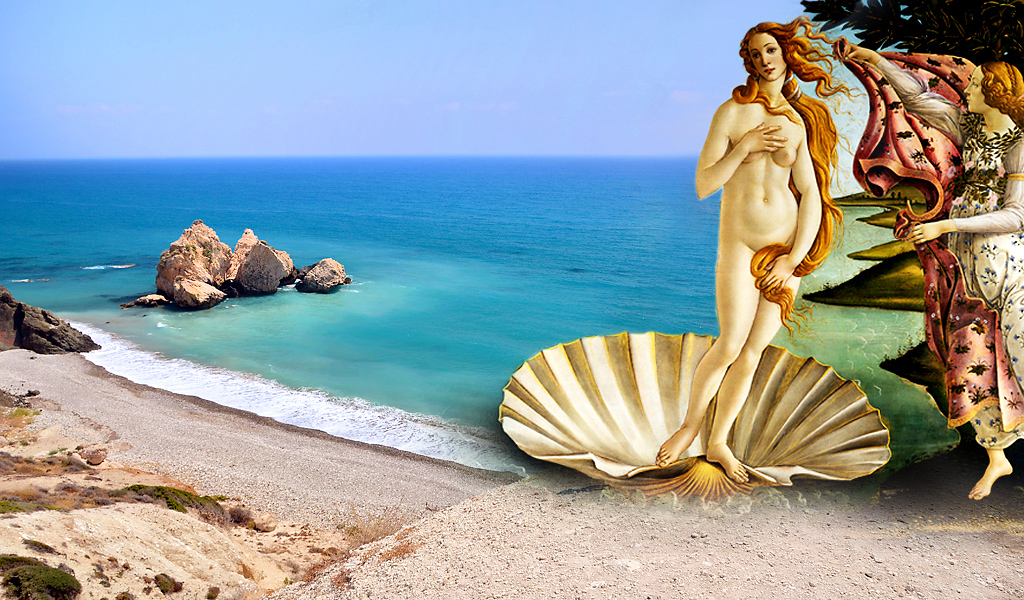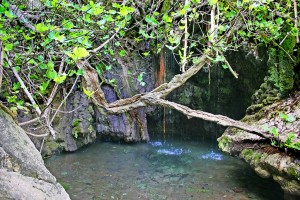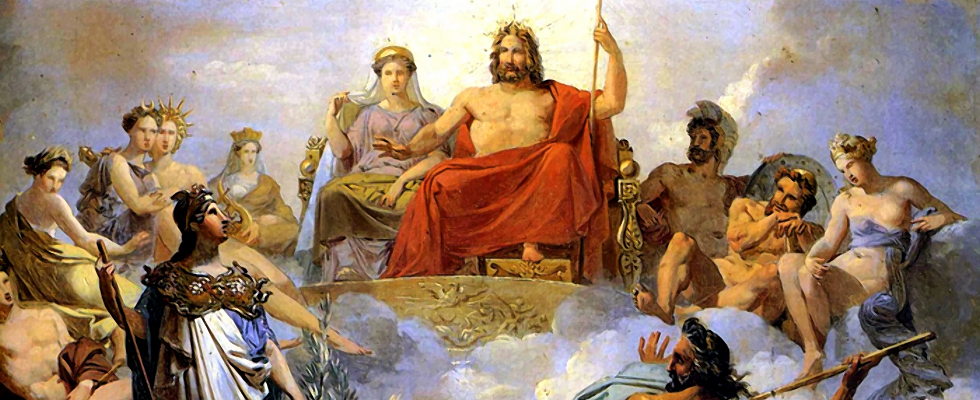The whole mythology of Cyprus is closely linked to the image of Aphrodite – the goddess of love and beauty. Aphrodite is the embodiment of feminine beauty, so you meet her name in many Greek myths.
The Patroness of the island

Homer continues with the foolowing description. After emerging from the sea, Aphrodite was welcomed on the island by the lovely Horai (Seasons). Since then, Cyprus became the favorite island for the goddess of love, where she preferred to spend all of her time, “the smiling goddess of Cyprus, wheose temple in Paphos is a fragrant altar” (Homer’s “Odyssey”).
Cyprus is also connected to the love story of Adonis and Aphrodite. In the west, on Cape Akamas, in the dense forest, a beautiful youth, Adonis hunted. He was tortured by his thirst so he came to a small lake, in which he first saw the goddess bathing naked. Subsequently, the lake became known as the Baths of Aphrodite and was one of the places of worship of the goddess in Cyprus.
The lake is located just above the sea, in a picturesque corner. Here, in the shadow of the branches, Aphrodite took her bathing after swimming in the sea. Adonis and Aphrodite, having exchanged glances, fell in love.

These ritual celebrations resemble the famous Panathenaic Games to some extent. It all began with a holy procession led by the kiniraty-priests, which took place at the holy places of the goddess, where there were a variety of flowers planted in her honor. It ended with a procession in the temple of the goddess Aphrodite in Palepafos. Thousands of pilgrims from all over the then-known ancient world came here to worship the goddess of love.
Atlantis and golden apples

Among those wishing to take part in the competition was a descendant of the god of the sea Poseidon, a man named Hippomenes. Before the race, Hippomenes asked the goddess Aphrodite for help, and she gave him three golden apples in order to slow Atalanta down. The apples were irresistible, so every time Atalanta got ahead of Hippomenes, he threw an apple ahead of her, and she would run after it. In this way, Hippomenes won the footrace and came to marry Atalanta.
Another myth associated with Cyprus and, in particular, with Paphos, is the myth of Pygmalion and his love for the beautiful Galatea. Pygmalion created a female statue of ivory; the statue was so perfect that the creator fell in love with it. Aphrodite took pity on the lovers, and breathed life into the magnificent statue.
The couple had a son, named Paphos, who became the founder of the homonymous town, which he built in gratitude for his birth. He is also credited with the creation and the first temple in honor of the goddess of love.
Myths about the island’s name
The modern name of the island is mentioned in Homer’s “Iliad.” But for the origin of the island’s name, there are many legends. Some say that it comes from a small tree called “Cyprida” growing in Arabia, Persia and Egypt. The tree was brought here by the island’s first inhabitants. There is also a version that the name belonged to one of the Cyprus cities located in the northern part of island (between Ankanthou and Kerinia).
According to another legend, the word “kipris” refers to the goddess Aphrodite, who Homer called Kiprida. Another suggestion is that the island of Cyprus has been named in honor of the son or daughter of the king Kinir, whose name is mentioned by Homer. The genealogy of the family was lost in the myths of antiquity though.
The most credible story it is that the island was named in honor of copper, from which it acquired its present name. After all, Cyprus was one of the first countries that started to process copper and mining led to an explosion in the economic life of the island.
Conclusion
Mythology embraces the entire history of the island, finding “evidence” here and there that the gods resided on the island. Just immerse yourself in these mysteries, believe in the unbelievable, and Cyprus will give you lots of interesting stories and unforgettable moments!
